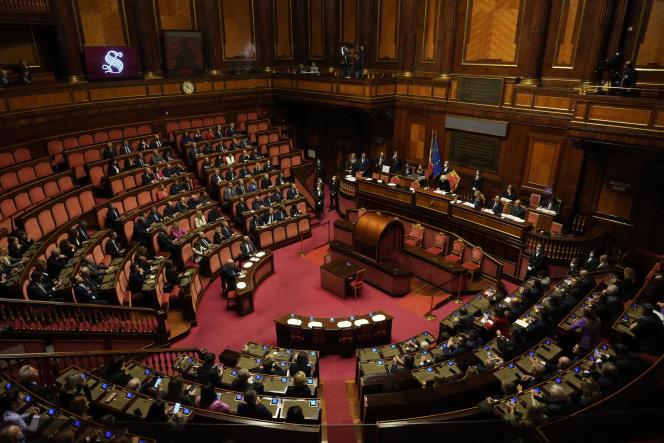Artificial Intelligence (AI) has become increasingly influential across various sectors of society, revolutionizing the way we operate. One intriguing application of AI is the generation of automated text, including speeches delivered in parliamentary settings. Recently, a heated debate emerged when an Italian senator presented an AI-generated speech in the Italian parliament, intending to spark discussion. This article delves into the implications of employing AI in generating parliamentary speeches within the Italian context.

The Advancement of Artificial Intelligence
AI has made significant strides in recent years, owing to the development of advanced language models such as GPT-3.5. These models are trained on vast amounts of textual data, enabling them to generate coherent and compelling text. AI has found applications in diverse areas, including journalism, translation, and content creation.
The Use of AI-Generated Speeches in Parliament
The incident involving the senator reading an AI-generated speech in the Italian parliament has raised several concerns. On one hand, proponents argue that utilizing AI-generated speeches can offer benefits such as efficiency in speech preparation, reduced workload for politicians, and the ability to articulate complex arguments more clearly and convincingly. Furthermore, AI could help mitigate risks such as misquotations or inaccuracies in speeches.
On the other hand, concerns regarding the originality and authenticity of AI-generated speeches have been raised. Politicians are elected to represent the people and communicate their opinions, ideas, and values. The use of AI-generated speeches might cast doubt on the sincerity and authenticity of politicians themselves, compromising the trust of voters. Additionally, AI might be vulnerable to manipulation, as generated speeches could be tailored to specific agendas or biases.

The Role of Parliament in AI Discourse
The Italian parliament, like many other legislative institutions worldwide, must grapple with the implications of AI and its applications within the political landscape. It is crucial for lawmakers to thoroughly understand this technology and its potential consequences to ensure responsible and ethical use of AI.
One possible solution could involve the adoption of specific guidelines or regulations governing the use of AI-generated speeches in parliament. These guidelines could establish transparency requirements, mandating politicians to disclose when utilizing AI-generated speeches. Furthermore, measures could be put in place to verify the authenticity and originality of presented speeches.
Moreover, the debate surrounding the implications of AI in the political context should engage both AI experts and political stakeholders. Understanding the perspectives of both parties is vital to strike a balance between efficient utilization of AI technology and upholding democratic principles.
Ethical Considerations and Safeguards
When employing AI-generated speeches, ethical considerations should take center stage. It is crucial to ensure that the use of AI does not compromise democratic processes or manipulate public opinion. Transparency regarding the use of AI-generated content and disclosure of its origin are essential.
Additionally, safeguards should be implemented to prevent AI-generated speeches from being abused for propaganda or misinformation purposes. This entails robust validation mechanisms to authenticate the content, stringent scrutiny of sources used for training the AI models, and ongoing oversight to maintain integrity.
Education and Public Awareness
To foster a well-informed discussion on AI-generated speeches in parliament, public awareness and education are paramount. It is essential to demystify the technology, clarify its capabilities and limitations, and communicate the potential benefits and risks associated with its use. Promoting transparency and open dialogue between citizens, politicians, and AI developers will facilitate a nuanced understanding of the issue.
Conclusion
The utilization of AI-generated speeches in the Italian parliament has ignited a significant debate surrounding the benefits, challenges, and ethical considerations associated with this practice. Striking the right balance between harnessing the potential of AI technology and upholding democratic principles is crucial. By establishing guidelines, promoting transparency, and engaging in informed discourse, Italy can navigate the complexities of AI-generated speeches and ensure responsible use within its parliamentary proceedings.
As AI continues to advance, it is imperative for societies worldwide to address the implications of AI-generated content, particularly within political domains. By doing so, we can shape a future where AI serves as a valuable tool while preserving the authenticity and integrity of democratic processes.
